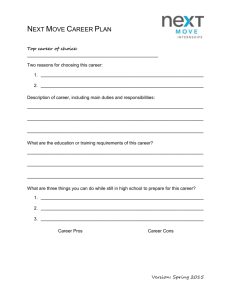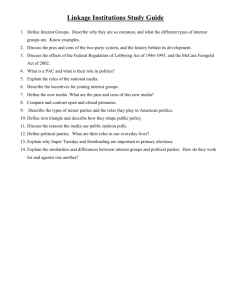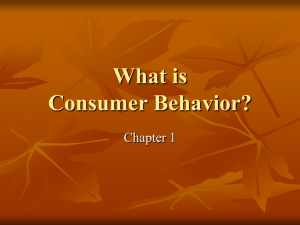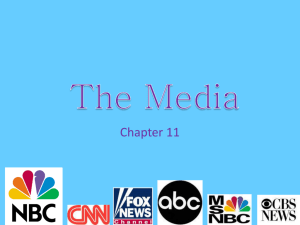Information Literacy Journalism Finding and Evaluating On-line Information • What: Newspapers, Newsmagazines, Television
advertisement
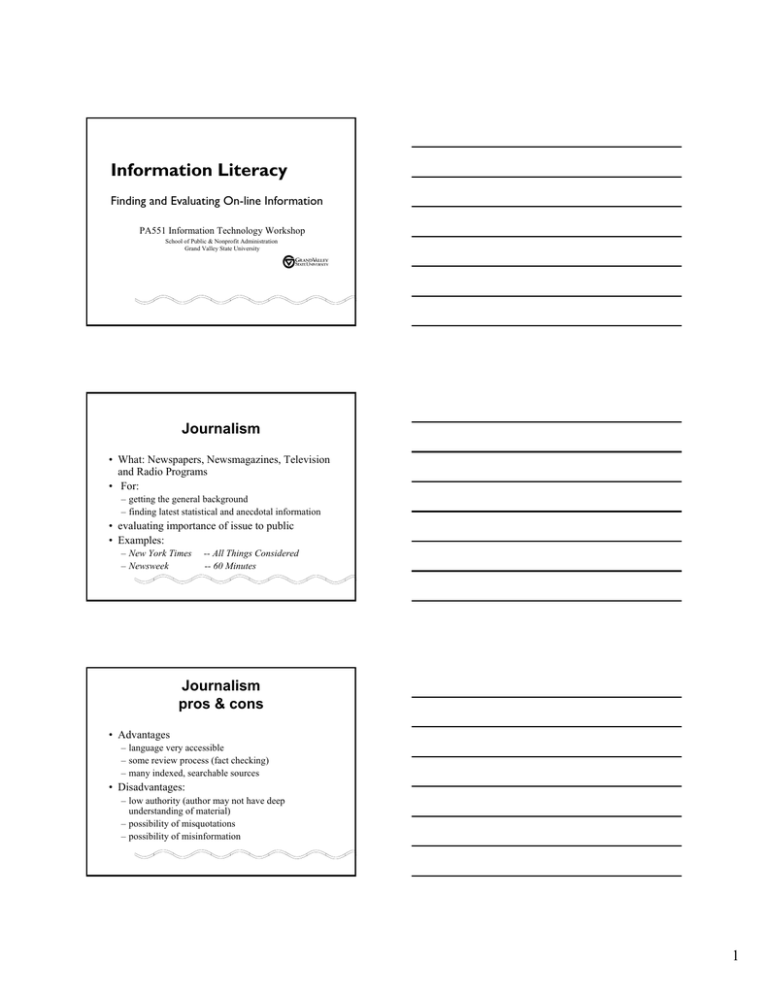
Information Literacy Finding and Evaluating On-line Information PA551 Information Technology Workshop School of Public & Nonprofit Administration Grand Valley State University Journalism • What: Newspapers, Newsmagazines, Television and Radio Programs • For: – getting the general background – finding latest statistical and anecdotal information • evaluating importance of issue to public • Examples: – New York Times – Newsweek -- All Things Considered -- 60 Minutes Journalism pros & cons • Advantages – language very accessible – some review process (fact checking) – many indexed, searchable sources • Disadvantages: – low authority (author may not have deep understanding of material) – possibility of misquotations – possibility of misinformation 1 Journalism resources (part1) • LexisNexis – “general news - magazines and journals” 450+ titles including:* • Newsweek (1975) • Business Week (1975) • US News & WR (1975) • The Economist (1975) • The Weekly Standard (1994) • Time (rolling)* – “general news - major papers” 50+ titles including: • USA Today (1989) • Washington Post (1977) • New York Times (1980) – “transcripts” including: • All Things Considered (NPR) • Special Report with Brit Hume: (Fox) • Google News (news.google.com) *Time Magazine under “Time Inc. Publications,” back 2 years (rolling) Journalism resources (part 2) • Michigan Newspapers: – Detroit News (1999) – Grand Rapids Press (2002) – Lansing State Journal (1999) • InfoTrac Custom 120 Full Text Newspapers, includes: – New York Times (2000) – Washington Times (1996) – Grand Rapids Press (2000) • Proquest General Reference General Interest Module includes: – Time (1992) – Weekly Standard (2001) – Newsweek (1998) – The Economist (1991) – U.S. News / WR(1988) – Wall Street Journal (1988) * * Full text for Wall Street Journal is under Poquest’s “Newspaper Abstracts” Policy Advocacy • What: newsletters; commentary in magazines, journals, broadcast media; documentary films / videos • For: – personal opinions – official organization positions – policy arguments • Examples: – Fahrenheit 911 -- Sierra Magazine – Heritage Foundation Executive Memorandum 2 Advocacy pros & cons • advantages: – very accessible language – plentiful and varied sources • disadvantages: – only one side is presented – may be no review process (beyond editing) – may be disguised as journalism or research Advocacy resources • ABI/INFORM Trade & industry • Meta policy sites – Public Agenda Online (www.publicagenda.org) – Almanac of Policy Issues (www.policyalmanac.org) – OnTheIssues.org (www.ontheissues.org) • Web Search Engines – Google (www.google.com) – Teoma (www.teoma.com) – All The Web (www.alltheweb.com) Professional Publications • What: publications sponsored by an organization for medical, legal, administrative, religious, etc. • For: – – – – news important to members policy positions of organizations and officers the perspective of people close to an issue policy arguments 3 PA / NP - specific professional publications • • • • • • • • PA Times (www.aspanet.org/patimes) Governing Magazine (Proquest, 1988; LexisNexis, 1992) Nonprofit Times (www.nptimes.com) The Public Manager (Proquest) PM: Public Management Magazine (Proquest) Government Executive Magazine (www.govexec.com) Philanthropy News Digest (fdncenter.org/pnd) Chronicle of Philanthropy (philanthropy.com – subscription only) Academic Research • What: Scholarly journals • For: – scientific findings – survey research – disciplinary perspectives • Examples: – Public Administration Review – Nonprofit and Voluntary Sector Quarterly Academic Research pros and cons • advantages: – methodology and conclusions subject to blind review (peer review) • disadvantages – inaccessible (academic jargon, complex methodologies, cryptic tables) 4 Academic Research resources • ProQuest General Reference - Social Science Module (check “peer reviewed” option) • Wilson Select Plus / First Search • ECO / First Search • EBSCOhost E-Journals • LexisNexis (law journals) • Infomine (infomine.ucr.edu) • Google scholar (scholar.google.com/) For a list of journals at GVSU and their online and hard copy location, see http://www.gvsu.edu/spna/resources/peer_review.pdf Applied Research • What: Publications from university research centers, planning agencies, think tanks • For: – survey research – local conditions and trends • Examples: – The Billion Dollar Impact: Kent County Nonprofits in 1999 – State of Ohio's Urban Regions Reports: Employment Change – Pharmaceuticals: Access, Cost, Pricing, and Directions for the Future Applied Research pros and cons • advantages: – fair language accessibility • disadvantages – often limited to single geographic area (generalization issue) – hard to locate (limited publication) – often non-standardized data 5 Applied Research resources • Web Search Engines – – – – Infomine (infomine.ucr.edu) Google (www.google.com) Teoma (www.teoma.com) All The Web (www.alltheweb.com) • ISI Basic Social Science Index (abstracts only) Historical Research • What: (a) articles older than 20 years; (b) books old enough to be in the public domain; (c) old web pages • For – Historical perspective – Classic articles – Interesting trivia and quotes • Example: Articles by Woodrow Wilson, Jane Adams, Richard Childs, Mary Follet. Web pages like Vice President Gore's National Partnership for Reinventing Government; FEMA web site on 13 Sept 2001 Historical research pros & cons • advantages – Can have high authority – Demonstrates thoroughness – Provides novelty • disadvantages – Easy to misinterpret (change in language, context) – Hard to find 6 Historical Research resources • Old print articles – ASP Online (in Proquest) 1100+ titles (1740-1940) – J-Store about 200 titles, including: • Political Science Quarterly 1886-1999 • Administrative Science Quarterly 1956-2000 • Books (in public domain): – Project Gutenberg ( www.gutenberg.org ) • Defunct / old version web sites – CyberCemetery ( govinfo.library.unt.edu ) – Way Back Machine ( www.archive.org ) Expert opinion • What: testimony of experts, books, personal interviews, magazine and journal articles, list serves, discussion boards, personal interviews • For – all purposes – but not peer reviewed • Example: personal interview with John Ort, Deputy State Director of Homeland Security and Emergency Management; Paul Light on “True Size of Government,” NPR’s Talk of the Nation, 24 Jan 04; Administrative Evil by Dan Balfour Expert opinion pros & cons • advantages – high authority (check credentials) • disadvantages – may be advocate (selling policy) – may be consultant (selling self) – may be quacks 7 Expert opinion resources (part 1) • Books – NetLibrary – a9.com (Amazon.com full text book search) – Questia subscription service (www.questia.com) • Congressional speeches and testimony – Thomas (thomas.loc.gov) – GPO (www.access.gpo.gov/su_docs) • Online forums – Usenet & listserves (see tile.net for guide) Expert opinion resources (part 2) • Interviews – LexisNexis, News Transcripts, includes: • • • • Meet The Press (NBC) The O'Reilly Factor (Fox) The Diane Rehm Show (NPR) Hardball (MSNBC) Public Information • What: Documents published by US, state or local governments • For: – – – – government policies program descriptions research government compiled statistics • Example: – FBI Uniform Crime Report, – Congressional Record 8 Public Information pros & cons • advantages: – highly standardized – assume a review • disadvantages: – "Politics of Numbers" – outdated standards (poverty line?) – incompatible standards (census "race" definition) Public Information resources • GPO (www.access.gpo.gov) • National Technical Information Service (www.ntis.gov) • FirstGov (www.firstgov.gov) • LexisNexis Government Periodicals Index • Federal Electronic Publications from U of M (http://www.lib.umich.edu/govdocs/fedelec.html ) 9


